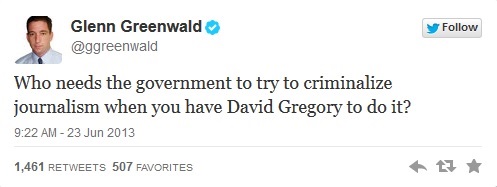Part of the Series
Moyers and Company
Support justice-driven, accurate and transparent news — make a quick donation to Truthout today!
David Gregory ignited further controversy on Meet the Press this weekend when he asked Glenn Greenwald, the journalist who first broke the story of Edward Snowden’s leaked NSA documents, this question:
GREGORY: To the extent that you have aided and abetted Snowden, even in his current movements, why shouldn’t you, Mr. Greenwald, be charged with a crime?
Greenwald fired back:
GREENWALD: I think it’s pretty extraordinary that anybody who would call themselves a journalist would publicly muse about whether or not other journalists should be charged with felonies. The assumption in your question, David, is completely without evidence, the idea that I’ve aided and abetted him in any way. The scandal that arose in Washington before our stories began was about the fact that the Obama administration is trying to criminalize investigative journalism by going through the e-mails and phone records of AP reporters, accusing a Fox News journalist of the theory that you just embraced, being a co-conspirator in felonies, for working with sources.
If you want to embrace that theory, it means that every investigative journalist in the United States who works with their sources, who receives classified information, is a criminal. And it’s precisely those theories and precisely that climate that has become so menacing in the United States. It’s why The New Yorker’s Jane Mayer said, “Investigative reporting has come to a standstill,” her word, as a result of the theories that you just referenced.
GREGORY: Well, the question of who’s a journalist may be up to a debate with regards to what you’re doing. And of course anybody who’s watching this understands I was asking a question; that question has been raised by lawmakers, as well. I’m not embracing anything. But obviously, I take your point.
After going off-air, Greenwald continued the conversation via Twitter:

In response to Greenwald’s accusation, Gregory said:
“I want to directly take that on. This is the problem from somebody who claims that he’s a journalist, who would object to a journalist raising questions, which is not actually embracing any particular point of view. And that’s part of the tactics of the debate here when, in fact, lawmakers have questioned him. There’s a question about his role in this, The Guardian’s role in all of this. It is actually part of the debate, rather than going after the questioner, he could take on the issues. And he had an opportunity to do that here on Meet the Press.”
The idea that Greenwald should be prosecuted was originally put forward by lawmaker Rep. Peter King (R-N.Y.), the chairman of the House Subcommittee on Counterterrorism and Intelligence, who falsely told Fox News that Greenwald was threatening to disclose the identities of CIA officers. And as The Washington Post’s Erik Wemple points out, Gregory’s question was a loaded one, “very much in the tradition of ‘how long have you been beating your wife.’” Journalism professor and media critic Jay Rosen agrees:
Gregory’s words: To the extent that you have aided and abetted Snowden… renders the situation in a threatening way. His premise packs a punch. For the criminalization of journalism is most likely to happen when normal relationships with sources get called “aiding and abetting” by the state. That’s why so many journalists flipped out when similar language was used in a government affidavit about James Rosen, the Fox News reporter who was investigated in a separate leak case.
The most troubling part of the interview, however, may be something else Gregory said to Greenwald at the very end of the interview: “…The question of who’s a journalist may be up to a debate with regards to what you’re doing.” There’s a line, Gregory appears to be saying. He’s on one side of it, and Greenwald — a constitutional lawyer, blogger and columnist who, for the Snowden leaks, stepped into the role of “reporter” — may be on the other. Perhaps Gregory believes Greenwald — who at one point Gregory called a polemicist — should not get the same protections under the First Amendment that journalists like David Gregory receive.
But Greenwald’s role in the Snowden NSA story has been that of a journalist, part of a long tradition of reporters who uncover information by talking to those who have it, then analyzing and presenting what they’ve found out to the public. Attempts by big media journalists like Gregory to establish who is worthy of the constitutional protection afforded to the press lie on the edge of a slippery slope.
Media that fights fascism
Truthout is funded almost entirely by readers — that’s why we can speak truth to power and cut against the mainstream narrative. But independent journalists at Truthout face mounting political repression under Trump.
We rely on your support to survive McCarthyist censorship. Please make a tax-deductible one-time or monthly donation.